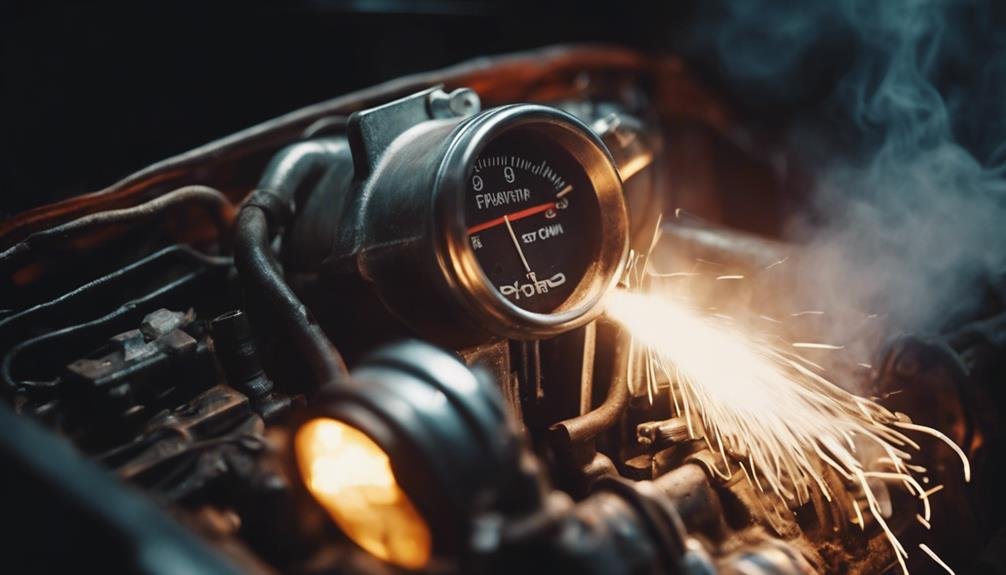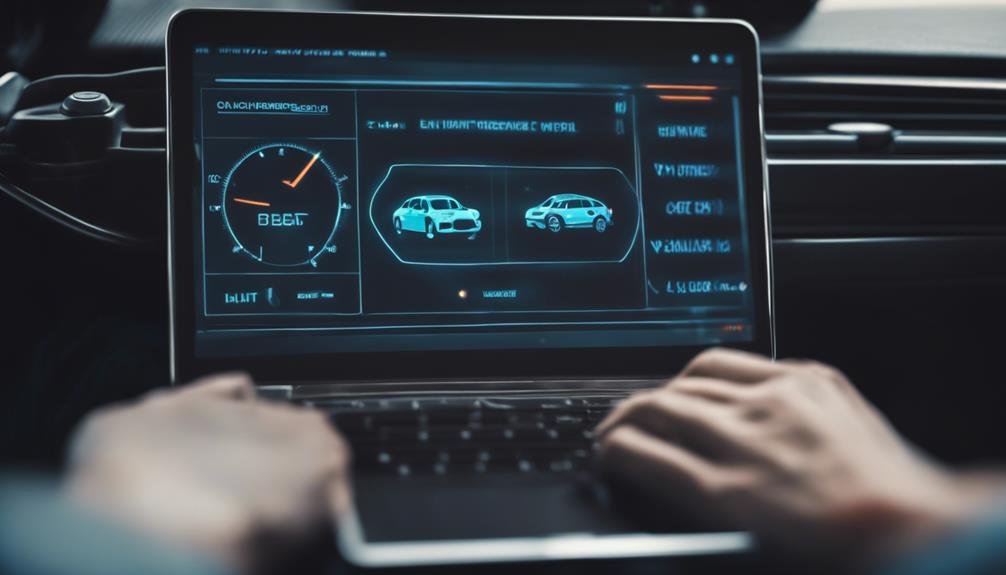When your check engine light starts flashing, it's an important warning sign that your vehicle's onboard computer has detected a serious problem that requires immediate attention, and ignoring it can lead to costly repairs and potential engine damage. Common causes include engine misfires, faulty oxygen sensors, and loose gas caps, which can lead to severe engine damage if left unchecked. Prompt professional assistance is vital to diagnose and repair the issue, as ignoring the flashing light can lead to further damage and safety hazards. To get to the root of the problem, continue exploring the causes and solutions behind your flashing check engine light.
Key Takeaways
- A flashing check engine light indicates a serious problem that requires immediate attention to prevent costly repairs and potential engine damage.
- Common causes of a flashing light include engine misfire, loose gas cap, and faulty oxygen sensor, which can lead to severe engine damage if ignored.
- Ignoring the flashing light can lead to severe engine damage, safety hazards, and costly repairs, making prompt professional help crucial.
- A flashing light is a critical warning that requires immediate attention, and different light behaviors require different actions to address the underlying issue.
- A professional mechanic with an OBD-II scanner can diagnose the issue and provide accurate repair by deciphering the trouble codes extracted from the vehicle's onboard computer.
Causes of a Flashing Light
When your check engine light starts flashing, it's crucial that you address the issue promptly, as it's typically a sign that your engine is experiencing a critical problem that requires immediate attention, such as engine misfires that can cause severe damage if ignored.
A flashing check engine light is a warning sign that something is seriously wrong, and you shouldn't delay in addressing the issue.
One common cause of a flashing light is an engine misfire, which can lead to damage to your catalytic converter, spark plugs, and other engine components. A loose or faulty gas cap can also trigger the light, as can oxygen sensor disruptions.
Ignoring the flashing light can result in costly repairs and potential engine damage. It's crucial to take immediate action when you see the light flashing, as putting it off can lead to more severe problems.
Don't hesitate to seek professional assistance to diagnose and repair the issue, as timely attention can save you money and headaches in the long run.
Check Engine Light Codes Explained
You can quickly uncover the root cause of your flashing check engine light by deciphering the specific codes generated by your vehicle's onboard computer. These codes, unique to each vehicle, provide valuable insight into the exact issue triggering the flashing light. By using an OBD-II scanner, you can retrieve these codes and gain a deeper understanding of the problem.
Understanding check engine light codes is important for accurate diagnosis and repair. Mechanics rely on these codes to identify the source of the issue, which could be related to misfires, oxygen sensor failures, or catalytic converter problems, among other things. Proper interpretation of these codes is vital for addressing the underlying issue causing the flashing light.
With the right tools and knowledge, you can pinpoint the problem and take the necessary steps to fix it. By deciphering the codes, you'll be one step closer to resolving the issue and getting your vehicle back on the road.
Engine Misfire and Damage

As you decode the check engine light codes, you may uncover an engine misfire, a severe issue that demands immediate attention to prevent catastrophic damage to your engine. A flashing check engine light is a warning sign that your engine is misfiring, which can lead to critical damage to your engine components if left unattended.
To address the issue, it's vital to identify the underlying cause of the misfire. Common causes include:
- Faulty spark plugs or ignition coils
- Fuel delivery problems, such as clogged fuel injectors or faulty fuel pumps
- Oxygen sensor failures or other sensor malfunctions
- Other engine-related issues, such as worn piston rings or cylinder head problems
Ignoring the flashing check engine light can lead to costly repairs and further engine damage. To prevent this, it's important to seek professional assistance to diagnose and repair the underlying cause of the engine misfire. By doing so, you can safeguard the longevity and performance of your vehicle.
Ignoring the Light Is Risky
Ignoring the flashing check engine light can be a costly mistake, putting your engine and entire vehicle at risk of severe damage. If your engine is misfiring, it might indicate a serious problem that requires immediate attention. Driving with a flashing check engine light is risky and can result in further damage to the vehicle. A steady check engine light usually indicates a less urgent issue, but a blinking light is a warning sign that demands prompt action.
| Light Behavior | Action Required |
|---|---|
| Steady Light | Schedule an appointment with an auto repair shop soon |
| Blinking Light | Stop driving and seek immediate assistance |
| Flashing and Steady Light | Check your owner's manual for guidance or seek help ASAP |
| No Light | No issue detected, but still take care of regular maintenance |
| Intermittent Light | Monitor the light and seek help if it persists or worsens |
Ignoring the flashing light can lead to severe engine damage or catalytic converter failure, resulting in costly repairs. To avoid this, take care of your vehicle by seeking professional help promptly when the check engine light is flashing.
Scanning for Trouble Codes

When the check engine light is flashing, getting to the root of the problem quickly is essential, and scanning for trouble codes is the next step in identifying the issue. You'll need an OBD-II scanner to extract these codes from your vehicle's computer system. These trouble codes provide specific information about the issue triggering the flashing check engine light. Each code corresponds to a particular problem within the engine or emissions system.
Here's what you can expect from scanning for trouble codes:
- Accurate diagnosis: Trouble codes help pinpoint the exact issue, ensuring an accurate diagnosis and repair.
- Specific information: Each code provides specific information about the problem, saving you time and money.
- Efficient repair: Professional technicians rely on these codes to efficiently address the source of the problem.
- Informed decision-making: With trouble codes, you'll have the information you need to make informed decisions about repairs.
Scanning for trouble codes is an essential step in identifying the issue behind the flashing check engine light. By using an OBD-II scanner, you'll gain valuable insights into the problem, allowing you to make informed decisions about repairs and get back on the road quickly.
When to Seek Professional Help
If you're faced with a flashing check engine light, it's significant to recognize the warning signs that indicate you need professional help to diagnose and repair the underlying issue.
A flashing check engine light is a clear indication of a severe issue that demands immediate attention to prevent engine damage. Ignoring it can lead to costly repairs and potential safety hazards, so don't hesitate to seek professional help.
Certified technicians have the expertise and diagnostic tools to accurately identify the underlying cause of the problem, and they can provide the necessary repairs to get your vehicle running smoothly again.
When driving with a flashing check engine light, do so cautiously, and consider pulling over to address the issue as soon as possible to prevent further damage. Remember, prompt action is critical to preventing more severe problems from developing.
Don't take any chances – get professional help right away to safeguard your safety on the road.
Frequently Asked Questions
Can I Drive My Car With the Check Engine Light Blinking?
You shouldn't drive your car with the check engine light blinking, as it indicates a critical issue that needs immediate attention to prevent further engine damage and costly repairs.
What Is the Most Common Cause of Flashing a Check Engine Light?
You're wondering what's behind that annoying flashing check engine light. Well, you should know that the most common culprit is an engine misfire, often triggered by faulty spark plugs, ignition coils, or fuel delivery issues.
Why Is My Engine Light Blinking and My Car Shaking?
You're experiencing a blinking engine light and a shaking car, which is a clear sign that your engine is misfiring, causing vibrations while accelerating or idling, and you need to see a mechanic ASAP to prevent further damage.
Why Did My Check Engine Light Blink and Then Turn Off?
You're wondering why your check engine light blinked and then turned off – it's likely the issue temporarily resolved itself, but don't ignore it, as the underlying problem still needs to be addressed to prevent future damage.
Conclusion
When your check engine light starts flashing, it's a warning that something's seriously amiss under the hood. Don't ignore it, as engine damage or catastrophic failure can result from neglect.
Instead, grab a code scanner to identify the issue, and if you're not comfortable troubleshooting, seek a professional mechanic's expertise to diagnose and fix the problem.
Remember, a flashing check engine light is a call to action – respond promptly to avoid costly repairs or even an engine rebuild.
